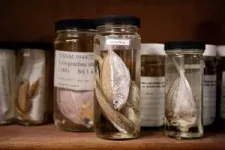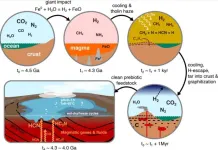(Press-News.org) The 2010 Gulf of Mexico Deepwater Horizon was the largest accidental oil spill in history. With almost 100 million gallons (379 million liters) of oil combined with dispersants suggested to remain in the Gulf, it is one of the worst pollution events ever. More than a decade later, its long-term effects are still not fully understood.
In a new study, researchers from Louisiana State University and Tulane University examined the endemic Gulf of Mexico fish species that may have been most impacted by the oil spill to see how their distribution has changed over the years. To get their data, they studied museum specimens from natural history collections, looked at relevant literature, and combed biodiversity databases.
With 1541 fish species known from the region, and 78 endemic fish species, the Gulf of Mexico is one of the most biologically rich and resilient marine environments in the world, but how much of this diversity is still left intact?
The study found that 29 out of the Gulf’s 78 endemic fish species haven’t been reported in museum collections since 2010. The Yucatan killifish, for example, which is considered endangered, was last reported pre-spill, in 2005, off the Yucatán Peninsula.
Six of the non-reported species are considered of greatest concern, because their areas of distribution largely overlap with the affected area – although the authors note that their absence in the Gulf in recent years cannot automatically be attributed to the oil spill.
“Understanding the impacts of catastrophic environmental events such as the 2010 Gulf of Mexico Oil Spill does not end when the wellhead is capped or when the last drops of oil cease to flow. The disaster only begins to end when the data no longer show impacts of the event. We are far from the beginning of the end for the Deepwater Horizon Oil Spill. Lingering chemicals, lost generations of wildlife and a continued ecosystem imbalance may all be factors that prevent an environment from rebounding from such cataclysmic events,” the authors note in their resear article.
However, they also point out that nature’s ability to recover should not be overlooked.
“The Gulf of Mexico continues to face many challenges, from the Dead Zone, to climate change, loss of coast habitats and continued oil spills. Efforts like this report aim to bring attention to vulnerable species that continue to be impacted by human activities and to the unique endemic fauna of the region,” the researchers write in conclusion.
Research article:
Chakrabarty P, Sheehy AJ, Clute X, Cruz SB, Ballengée B (2024) Ten years later: An update on the status of collections of endemic Gulf of Mexico fishes put at risk by the 2010 Oil Spill. Biodiversity Data Journal 12: e113399. https://doi.org/10.3897/BDJ.12.e113399
END
Fourteen years after the Gulf of Mexico oil spill, endemic fishes face an uncertain future
2024-04-18
ELSE PRESS RELEASES FROM THIS DATE:
For more open and equitable public discussions on social media, try “meronymity”
2024-04-18
CAMBRIDGE, MA — Have you ever felt reluctant to share ideas during a meeting because you feared judgment from senior colleagues? You’re not alone. Research has shown this pervasive issue can lead to a lack of diversity in public discourse, especially when junior members of a community don’t speak up because they feel intimidated.
Anonymous communication can alleviate that fear and empower individuals to speak their minds, but anonymity also eliminates important social context and can quickly skew too far in the other direction, leading to toxic or hateful speech.
MIT ...
Marine microbial populations: Potential sensors of the global change in the ocean
2024-04-18
Animal and plant populations have been extensively studied, which has helped to understand ecosystem processes and evolutionary adaptations. However, this has not been the case with microbial populations due to the impossibility of isolating, culturing and analyzing the genetic content of the different species and their individuals in the laboratory. Therefore, although it is known that populations of microorganisms include a great diversity, this remains largely uncharacterized.
Now, a new study from the Institut de Ciències del Mar (ICM-CSIC) recently published in the journal Microbiome highlights the potential of marine microbial populations as indicators ...
Metacognitive abilities like reading the emotions and attitudes of others may be more influenced by environment than genetics
2024-04-18
Twin studies have proven invaluable for teasing out the effects of both genetics and the environment on human biology. In a study published April 2 in Cell Reports, researchers studied pairs of twins to look at how the interplay of genetics and environment affect cognitive processing—the way that people think. They found that some cognitive abilities appear to be regulated more by environmental factors than by genetics.
“Past research has suggested that general intelligence—often referred to as intelligence quotient or IQ—has a heritability ranging from 50% to 80%,” says senior and corresponding author Xiaohong Wan of Beijing Normal University in China. ...
Salk Professor Satchin Panda named 2023 AAAS fellow
2024-04-18
LA JOLLA (April 18, 2024)—Salk Institute Professor Satchidananda Panda has been named a 2023 Fellow of the American Association for the Advancement of Science (AAAS), the world’s largest general scientific society and publisher of the journal Science. Panda is among 502 new AAAS Fellows spanning 24 scientific disciplines who were nominated by their peers for their distinguished efforts to advance science. The election recognizes his contributions to the field of chronobiology, particularly for applications to obesity and human health.
“The Salk community congratulates ...
New urine test has higher diagnostic accuracy for prostate cancer
2024-04-18
A new urine test that measures 18 genes associated with prostate cancer provides higher accuracy for detecting clinically significant cancers than PSA and other existing biomarker tests, according to a study published April 18 in JAMA Oncology. The urine test, MyProstateScore 2.0 (MPS2), was shown to meaningfully reduce unnecessary prostate biopsies while providing highly accurate detection of worrisome prostate cancers, the researchers concluded.
“In nearly 800 patients with an elevated PSA level, the new test was capable of ruling out the presence of clinically significant prostate cancer with remarkable accuracy. This allows patients to avoid more burdensome and ...
Floating solar’s potential to support sustainable development by addressing climate, water, and energy goals holistically
2024-04-18
Milan, April 17 2024 – The study, published in Nature Energy, is among the first to explore the FPV at the continental scale, finding that FPV installed at existing major reservoirs could produce 20-100% of the electricity expected from Africa’s planned hydropower dams. Using a state-of-the-art energy planning model covering the continent’s entire energy system, the researchers found that FPV is cost-competitive with other renewables and thus a key part of Africa’s future energy mix.
"Floating solar is fast becoming cost-competitive with land-based solar, and ...
Drawing a line back to the origin of life
2024-04-18
Scientists in Cambridge University suggest molecules, vital to the development of life, could have formed from a process known as graphitisation. Once verified in the laboratory, it could allow us to try and recreate plausible conditions for life's emergence.
How did the chemicals required for life get there?
It has long been debated how the seemingly fortuitous conditions for life arose in nature, with many hypothesises reaching dead ends. However, researchers at the University of Cambridge have now modelled how these conditions could occur, producing the necessary ingredients for life in substantial ...
Data-driven music: Converting climate measurements into music
2024-04-18
A geo-environmental scientist from Japan has composed a string quartet using sonified climate data. The 6-minute-long composition—entitled “String Quartet No. 1 “Polar Energy Budget”—is based on over 30 years of satellite-collected climate data from the Arctic and Antarctic and aims to garner attention on how climate is driven by the input and output of energy at the poles. The backstory about how the composition was put together publishes April 18 in the journal iScience as part of a collection “Exploring the Art-Science Connection.”
“I strongly hope that this manuscript marks a significant turning point, transitioning ...
Palaeontology: Discovery of new ancient giant snake in India
2024-04-18
A new ancient species of snake dubbed Vasuki Indicus, which lived around 47 million years ago in the state of Gujarat in India, may have been one of the largest snakes to have ever lived, suggests new research published in Scientific Reports. The new species, which reached an estimated length of between 11 and 15 metres, was part of the now extinct madtsoiidae snake family, but represented a distinct lineage that originated in India.
Debajit Datta and Sunil Bajpai describe a new specimen recovered from the Panandhro Lignite Mine, Kutch, Gujarat State, India, which dates ...
Racial discrimination and metabolic syndrome in young Black adults
2024-04-18
About The Study: The findings of this study with 322 participants suggest that racial discrimination predisposes Black young adults to metabolic syndrome via sleep problems and inflammation, which may serve as actionable targets for prevention in minoritized populations that could reduce existing disparities and promote health equity.
Authors: Nia Heard-Garris, M.D., M.B.A., M.Sc., of the Northwestern University Feinberg School of Medicine in Chicago, is the corresponding author.
To access the embargoed study: Visit our For The Media website at this link https://media.jamanetwork.com/
(doi:10.1001/jamanetworkopen.2024.5288)
Editor’s Note: Please ...







